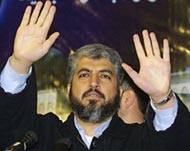Hit bears hallmarks of Israelis
The killing of a Palestinian resistance activist in Syria on Sunday bears all the hallmarks of an Israeli hit.

Tel Aviv has yet to claim responsibility for the assassination of Izz al-Din Shaikh Khalil, a Hamas member, who died after a bomb blew up his car.
The attack, nevertheless, appears to be the latest example of Israel‘s widely condemned policy of “extrajudicial assassinations” on foreign soil.
Syria, which has consistently voiced its support for Palestinian independence, insists it is a safe haven for Palestinian activists, as do other Arab countries.
But after what appears to be the second Israeli attack on Syrian territory within a year, this must be open to doubt.
Assassinations
Israel has targeted Palestinian fighters since at least 1973 when Israeli commandos killed three leaders of the Palestine Liberation Organisation in a Beirut raid.
|
“The Zionist enemy has opened the door for the battle to move outside Palestine“ Izz al-Din al-Qassam Brigades statement |
Other high profile killings include the 1995 shooting of Islamic Jihad leader Fathi Shaqaqi in Malta, and the 1988 slaying of prominent Palestinian commando chief Abu Jihad in Tunis.
In 1997, two Israeli agents were arrested in Jordan after trying to poison Hamas leader Khalid Mashaal, who is currently based in Damascus.
More recently, Israel launched a missile attack last year against what it said was a Hamas training camp near the Syrian capital.
Earlier this year, news reports said Syria had foiled another Israeli assassination attempt on Hamas’ Mishaal involving Yemenites.
Counter-terrorist operations
Israeli officials have frequently vowed to kill officials of groups responsible for what it labels “terror acts”, and those intent on killing Israelis.
 |
|
Israeli PM Ariel Sharon has vowed |
They say every nation has a duty to protect its citizens from threats to their lives, and that international law recognises those who directly take part in hostilities cannot claim immunity from attack.
Israel does not recognise the term “extrajudicial assassinations”, and prefers to call its killings “counter terrorist operations”.
However, much of the international community begs to differ.
After Khalil’s killing on Sunday, a Syrian government official told Aljazeera.net that “it is Israel‘s style to bribe people and lure them with money and then order them to assassinate others”.
International condemnation
His comments follow warnings by Syrian President Bashar al-Asad that his country will consider any attempt to assassinate Syria-based leaders of Palestinian groups as aggression against Damascus itself.
On this issue at least, the Syrian president seems to be swimming with the international tide rather than against it.
 |
|
Khalid Mishaal has survived more |
UN Secretary General Kofi Annan has called extrajudicial killings “violations of international law”, and has called on Israel to immediately end the practice.
He says such actions lead to a further deterioration of the situation.
Even the British government, which is widely perceived to be pro-Israel in the Arab world, condemns the practice.
Hamas reaction
It says “targeted assassinations” are unlawful, unjustified and counter-productive.
And given the reaction of Hamas’ armed wing to Sunday’s assassination, the British might be right.
“The Zionist enemy has opened the door for the battle to move outside Palestine,” the Izz al-Din al-Qassam Brigades said in a statement.
“Even though Izz al-Din al-Qassam … has let hundreds and thousands of Zionists move and travel in all capitals in the world, it was not us who started the struggle abroad, but Zionist enemy. And he will be responsible for what he did.”